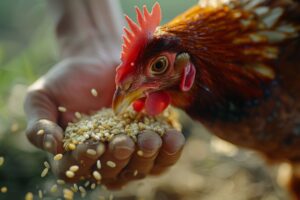Animal proteins are regarded as complete proteins. Proteins are large, complex molecules that play many critical roles in the body. Proteins are widely distributed in the human body, and found in tissues like muscle, bone, skin, and hair. They act as enzymatic catalysts, driving biochemical reactions, and serve essential functions, such as transporting oxygen in the bloodstream through molecules like hemoglobin. They are required for the structure, function and regulation of the body’s tissues and organs. Proteins are made up of building blocks known as amino acids. Amino acids are divided into two namely: Essential and Non-essential amino acids.
Essential Amino Acids: a vital component of human nutrition, are amino acids that cannot be synthesized by the body but must be obtained from diet. There are 9 essential amino acids crucial for various physiological functions. These include histidine, isoleucine, leucine, lysine, methionine, phenylalanine, threonine, tryptophan, and valine.
Non-essential amino acids: are those that can be produced or synthesized by the body through various metabolic processes. There are 11 of them. Non-essential amino acids include alanine, arginine, asparagine, aspartic acid, cysteine, glutamic acid, glutamine, glycine, proline, serine, and tyrosine.
Animal proteins are complete proteins which implies that they provide all the 9 essential amino acids needed by the body to function properly. Examples include meat, egg, and milk. Animal products provide the highest-quality protein sources, which is why they are regarded as complete proteins. A complete protein source is described as the food source containing all nine essential amino acids that cannot be produced by the human body. A person’s body needs a balance of all the 20 types of amino acids to function correctly. There are various types of animal-based protein and they include fish, beef, pork, mutton, chicken, turkey, eggs, milk and milk products.
Key Functions of Essential Amino Acids Found in Animal Protein
- Histidine: plays a crucial role in the production of histidine, a neurotransmitter essential for regulating immune function, digestion, and sleep.
- Isoleucine: is an oxygen-carrying pigment in red blood cells that helps control blood sugar and boosts energy.
- Leucine: is vital for muscle growth and repair. It also plays a role in regulating blood sugar levels and promoting wound healing.
- Lysine: is crucial for producing collagen, a protein that provides structure to skin, bones, and other tissues. It also helps to support immune function and promote calcium absorption.
- Methionine: helps regulate metabolic processes.
- Phenylalanine: produces neurotransmitters that facilitate communication between the brain and nerve cells, and improve memory.
- Threonine: is important for the formation of collagen and elastin, which are proteins that support skin and connective tissue.
- Tryptophan: essential for producing serotonin, which regulates mood, sleep, and appetite, and melatonin, which controls the sleep-wake cycle.
- Valine: stimulates muscle growth and regeneration, and is involved in energy production.
Types of Animal-Based Protein
Animal-based proteins come from a variety of sources, including:
- Fish: a rich source of high-quality protein, omega-3 fatty acids, and various vitamins and minerals.
- Meat: beef, pork, and lamb provide not only protein but also essential nutrients like iron, zinc, and B vitamins.
- Poultry: chicken and turkey are excellent sources of lean protein, providing essential amino acids without excessive fat.
- Dairy Products: milk, cheese, and yogurt offer high-quality protein along with calcium and vitamin D.
Why Animal Protein Matters
A balanced intake of essential and non-essential amino acids, especially from high-quality animal proteins, is crucial for maintaining health and well-being. By understanding the significance of these proteins and their sources, you can make informed dietary choices to support your overall health.
Blog Post References
https://en.wikipedia.org/wiki/Protein(nutrient)
https://www.medicalnewstoday.com/articles/322827#plant-vs-animal-protein
https://noiler.net/animal-protein-the-complete-source-of-protein
Image from freepicdownloader.com









